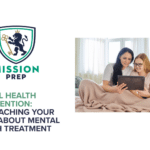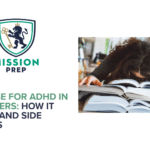Strategies for Parents and Families
As a parent of a teenager, you might find yourself in situations that leave you feeling frustrated or concerned.
Do you constantly remind your teen to complete their homework, only to discover it still sits untouched? Have you noticed them zoning out during conversations or struggling to keep up with friends in social settings? Perhaps you’ve observed impulsive decisions that leave you worried about their safety.
If any of this sounds familiar, you’re not alone. Many parents grapple with similar challenges, and it could be a sign of ADHD in adolescents.
Understanding the symptoms, diagnosis, and treatment options is the first step for effectively supporting your teen. In this blog, we’ll explore the intricate world of ADHD together, providing valuable insights to help you navigate this journey and empower your teenager to thrive both at home and in school.
Understanding ADHD in Adolescents
What is ADHD?
ADHD, or Attention Deficit Hyperactivity Disorder, is a neurodevelopmental condition that impacts millions of teens. It’s often marked by challenges in attention, impulse control, and hyperactivity.
However, unlike younger children, adolescents with ADHD might not show the typical hyperactive behaviors we commonly think of. Instead, they often find themselves battling with inattention, struggling to concentrate on schoolwork and maintain relationships.
ADHD Symptoms in Teens
Recognizing ADHD symptoms in teens can be challenging, as they may vary widely. Here are some common signs to look out for:
- Inattention: You might notice your teen having a tough time focusing on tasks, leading to some careless mistakes in their schoolwork. They could seem easily distracted, forgetful, or often misplace things.
- Hyperactivity: While some teens outgrow hyperactivity, others still can’t seem to sit still. You might see them fidgeting, feeling restless, or having trouble staying in their seat during class or meals.
- Impulsivity: This might show up as interrupting conversations, making snap decisions without thinking things through, or having a hard time waiting for their turn.
These symptoms can profoundly affect your teen’s daily life, creating hurdles in school, straining social interactions, and potentially causing rifts within the family.
Diagnosing ADHD in Teens
Why Diagnosis is Important
Getting an accurate ADHD diagnosis is essential for unlocking your teen’s potential. A proper diagnosis paves the way for effective treatment and support, leading to remarkable improvements in their quality of life.
The Diagnostic Process
Diagnosing ADHD typically involves several steps, including:
- Comprehensive Evaluation: A mental health professional will conduct a thorough evaluation, assessing your teen’s symptoms and their impact on daily life.
- Gathering Input: Input from parents, teachers, and the teen themselves is vital. This can help paint a comprehensive picture of how ADHD affects your teen at home and in school.
- Assessment of Symptoms: The clinician will review the specific symptoms and determine whether they align with ADHD or another condition.
It’s important to differentiate ADHD from other mental health issues, such as anxiety or depression, which commonly co-occur. A thorough assessment ensures your teen receives the most effective treatment tailored to their needs.
Treatment Options for ADHD
Therapeutic Approaches
Fortunately, there are numerous effective treatment options for ADHD. Here are some you might consider:
- Cognitive Behavioral Therapy (CBT): This approach can help your teen come up with coping strategies and get better at managing their emotions. With CBT, they’ll learn to handle their thoughts and behaviors in more positive ways.
- Family Therapy: Improving communication in the family can really change things for the better. Family therapy is all about helping everyone understand each other more, which can lead to a much more supportive environment for your teen.
Medication
For some teens, medication can be an essential part of managing ADHD symptoms. Stimulant medications are commonly prescribed and can help improve focus and reduce impulsivity. It’s crucial to work closely with a healthcare provider to find the right medication and dosage that works best for your teen.
Lifestyle Modifications
In addition to therapy and medication, adopting healthy habits can significantly help in managing ADHD symptoms:
- Regular Exercise: Physical activity can boost focus and mood. Encourage your teen to engage in activities they enjoy, whether it’s sports, dance, or simply taking walks.
- Balanced Diet: A nutritious diet can impact mental clarity and energy levels. Incorporate whole foods, fruits, and vegetables into your teen’s meals.
- Consistent Sleep Schedule: Lack of sleep can make ADHD symptoms worse. Creating a consistent bedtime routine can help your teen get the rest they need.
- Mindfulness Practices: Techniques such as meditation or yoga can teach your teen how to calm their mind and improve focus.
The Role of Mission Prep Healthcare
At Mission Prep Healthcare, we understand that ADHD can cause major academic and social challenges for adolescents. That’s why we offer specialized programs designed to support teens facing these issues. Our approach is rooted in treating the entire family system, providing a safe and nurturing environment for growth.
Support for Teens and Families
Our academic and social challenge programs offer myriad benefits for adolescents struggling with ADHD. Firstly, we offer customized educational support aimed at tackling specific learning disabilities, time management challenges, and motivation issues—key concerns for those with ADHD. By improving academic performance through personalized strategies, these programs help students build confidence and develop a positive self-image.
Beyond academics, we focus on enhancing social skills. Teens learn how to build and maintain healthy relationships, manage peer pressure, and cope with social anxiety. Emotional literacy is another significant benefit, as they learn to understand and regulate their emotions, leading to better mental health and overall well-being.
Conclusion
ADHD is a complex condition that can affect many areas of a teen’s life, but understanding its symptoms, obtaining a proper diagnosis, and exploring treatment options can truly transform their experience. If you think your teenager might be facing challenges with ADHD, don’t hesitate to seek support!
At Mission Prep Healthcare, we’re dedicated to helping teens navigate these hurdles and set the stage for a bright future. With the right guidance, teens can flourish both academically and socially, and families can discover the fresh start they deserve. Remember, you’re not alone on this journey—we’re here to support you every step of the way!





















